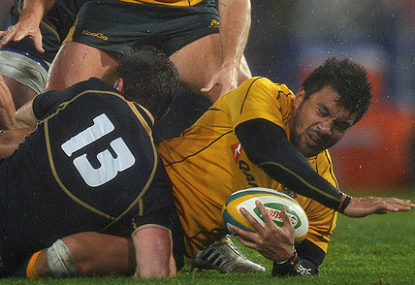Rugby desperately needs a new image. Since 1995, when the amateur code turned professional, it’s no longer the rah rahs and the leather patches. It’s the second biggest football code on the planet and it should project that image.
For more ammunition, the Rugby World Cup is the third biggest sporting event in the world every four years, after the Summer Olympic Games and the FIFA World Cup.
It’s time for change, and for the code to be recognised for its significance on the world stage.
The International Rugby Board, the governing body, isn’t capable and is so deeply entrenched in tradition that doesn’t count any more. The ARU could, but it needs a major shakeup as well.
Why is it the best possible rugby administrators – former Wallabies, coaches, and lateral thinkers with a deep knowledge of the 15-man code and business brains – don’t want to have anything to do with running the sport they have revered for most of their lives?
Easy answer. They are either too successful in their chosen profession, or don’t need the pettiness and aggro the position attracts in large doses.
So the first solution is to disband the ARU. Rugby needs a new image.
That will have two immediate pluses – doing away with state representation, and end for all time the jealousies and bitterness between Queensland and NSW that have hamstrung rugby in Australia for far too long..
For the life of me I cannot see how delegates from Western Australia, South Australia, Victoria, and Tasmania have anything of substance to offer rugby nationally. They are currently part of the ARU, but are just along for the ride.
Window dressing, trying to prove rugby is a national sport. Not even close.
Let’s get realistic.
Set up a new governing body and call it Rugby Australia, appointing five full-time supremos, and pay them $750,000 a year each. The chairman is to be appointed from within by the selected five.
And how are those administrators appointed?
Put 50 of the best Wallabies over the last 50 years in one room, making sure the 17 Wallaby captains over that period are included.
Also include renowned rugby thinkers like former Wallaby coaches Rod Macqueen, Alan Jones, Bobby Dwyer, Eddie Jones, and John Connelly, plus some vastly experienced media personalities, with rugby as second nature. Think Sally Loane, Norm Tasker, Jim Webster, Spiro Zavos, Wayne Smith, Greg Growden, Greg Clark and Rod Kafer, to name a few.
Not enough has ever been made of the enormous amount of rugby talent available.
What a spirited gathering of rugby minds that meeting would produce. And the net result would be the best five supremos possible.
Two of them to represent Australia at the IRB to shake up that dormant governing body. A third to represent Australia at SANZAR to give a wider understanding within rugby Australia of what other countries are thinking.
First cab off the rank, though would be the appointment of a CEO with a rugby background.
The quintet would be charged with heading the sub-committees required to improve the structure to make Australia the number one rugby nation again.
The five committees:
* Tour and representative rugby, including the appointment of the Wallaby coach and selectors.
* Club rugby. For so long there hasn’t been enough attention paid to grass roots rugby by the governing body. More on that shortly.
* School rugby, tomorrow’s Super Rugby reps, and Wallabies.
* Sponsorship and media, the lifeblood of the sport.
* And recruitment, especially among the indigenous players, who like the Ellas are so naturally gifted but rarely nurtured except by Lloyd McDermott, the first indigenous Wallaby, in 1962.
Those sub-committee heads would recruit specialist members, replacing the army of ARU employees who are currently not seen nor heard.
High on the list of priorities would be to clean up the club and sub-district scenes, starting with banning professionalism, and reverting to the old amateur status of every player paying an annual subscription to become a club member with training on Tuesday and Thursday nights, and playing only on Saturday.
Monday to Friday all club players would be gainfully employed, wherever they choose to work. The financial savings to rugby clubs would be mountainous.
Professionalism has sent just about every club to the wall. It should never have been entertained in the first place.
If the current trend continues there won’t be any breeding ground for Super Rugby, the foundation for the Wallabies. Club rugby will die a natural death.
And one of the tragic side issues has been the closing of so many licensed rugby clubs, the hub of club life. Every avenue must be explored to restore that vital link between player, sponsor, and supporter.
There are obviously many other permutations to these suggestions. But rather than get bogged down with detail as is rugby’s usual want, the simpler we can keep the concept, the more effective the five supremos will be. Then, they will get the Wallabies back on top of the rugby world again.
And keep them there.
This is the first in a four-part Rugby Solutions series running this week on The Roar. Our rugby experts will be answering the question: If you were in charge of Australian rugby, how would you fix the problems you see and make us the number one rugby country in the world, again?





























































































